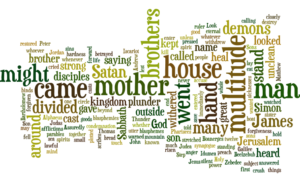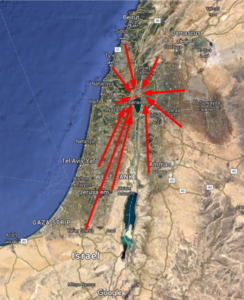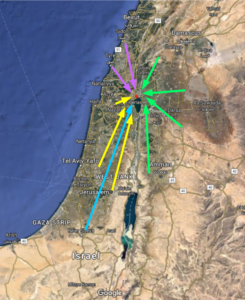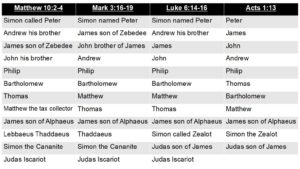The Ministry of Jesus in Galilee
Mark 1:16—8:30
A New King (1:16—3:6).
Kingdom is Near (1:15)
Popularity (1:16-45).
Conflict (2:1—3:6).
Jewish Leaders Reject Him (3:6)
A New Kingdom (3:7—6:6)
Kingdom Has Small Beginnings (4:3)
Jesus Withdraws (3:7-12).
With His continued popularity and the plotting against Him, He decides to withdraw to the Sea of Galilee.
People come from all corners of the region to see Jesus (3:7-8).
The Pharisees’ traps did not deter the people at all.
Galilee is the surrounding area, but also mostly to the west.
Jerusalem is in Judea, which has the largest concentration of Jews in the south.
Beyond the Jordan, areas of the east. Likely Perea, Decapolis, Iturea.
Tyre and Sidon, areas to the north in Phoenicia (Lebanon).
Areas from the north, south, east, and west (as much as possible).
The crowds were so strong that He was worried they would crush Him (3:9-10).
They might press hard upon Him as one would press grapes.
He even asked for a small boat to be kept ready as an escape route if needed.
They all wanted to touch Him, thinking they would be healed.
This does happen in Ch. 5 when a woman touches His clothes and is healed.
They were desperate to be healed.
Again, the demons identify Jesus, while He insists they not reveal Him (3:11-12).

Once again the demons confess Him.
Earlier Mark identified Him as did God the Father, and many other demons.
It was not His time yet to be revealed.
Perhaps the Pharisees would be all the more diligent to find ways to kill Him.
We will see later that the scribes from Jerusalem would accuse Him of casting out demons by the ruler of the demons (3:22).
Perhaps they didn’t hear what the demons said about Jesus.
Twelve Chosen (3:13-19).
Jesus managed to find His way from the crowd to go up a mountain with twelve of His followers (3:13-15).
Out of His followers, there was an inner circle, these twelve.
Out of those twelve, there were three who were even closer, the first three mentioned in vs. 16-17.
Luke mentions that He prayed all night before this big decision.
These twelve men are reminiscent of the twelve patriarchs.
We don’t know much about Zebulun, Asher, or Issachar, just as we don’t know much about many of those mentioned below.
This is indicative of the new kingdom Jesus was establishing.
They, too, had a directive to be sent out (apostles) to preach.
They were also given the power to perform miracles.
Were they baptized in the Holy Spirit here? No, but in Acts 2.
They were granted gifts of the Holy Spirit before they were baptized in the Spirit.
Again, this was to confirm the word they were preaching.
Simon Peter—even though Andrew introduced his brother to Jesus, Peter gets the first mention. He becomes the most prominent of the original Twelve, even given the keys to the kingdom, opening it for both Jews (Acts 2) and Gentiles (Acts 10).
James and John—the sons of Zebedee. These three end up being in the inner inner circle of Jesus’ disciples. Jesus gives them the nickname Boanerges (Sons of Thunder) only mentioned here. It is not entirely known why Jesus called them this, but it could be because He knew they would ask to call fire down from heaven upon Samaritan villages that would not receive Jesus (Luke 9:51-56). James is the first of these Twelve to die as a martyr (Acts 12:2), and John outlived them all dying of natural causes (John 21:20-23).
Andrew—gets the first mention of those after Peter, James, and John. He is Peter’s brother and a former disciple of John the Baptist.
Philip—he was from Bethsaida and introduced Nathanael to Jesus (John 1:43-46). This is not the same Philip who preached to the Samaritans in Acts 8—he was chosen among seven other disciples.
Bartholomew—he is believed to be the Nathanael that was introduced to Jesus by Philip and is from Cana (John 21:2). His name means “son of Tolmai,” which could indicate that his full name was Nathanael son of Tolmai. He was initially skeptical of Jesus, but was fairly easily convinced (John 1:47-51).
Matthew—formerly known as Levi son of Alphaeus, tax collector called by Jesus earlier (2:14). His name means “gift of God” and could have been attributed to him after his initial encounter with Jesus. He could be the brother of James the son of Alphaeus.
Thomas—Aramaic for twin, with the reputation of being skeptical because his skepticism was after Jesus’ earthly ministry, witnessing all the wonders He performed, and being privy to all His teachings (John 20:24-29).
James the son of Alphaeus—there are three prominent Jameses mentioned in the NT: James son of Zebedee, James brother of Jesus, and James son of Alphaeus. Tradition calls them other things out of shorthand: James the Great(er), James the Just, and James the Less. If he is James the Less, then his mother was also a follower of Jesus who witnessed the crucifixion (15:40-41).
Thaddaeus—his first name was Lebbaeus, but he was also called Judas the son of James by Luke. John calls him “Judas (not Iscariot)” (John 14:22).
Simon the Cananite (Cananaean)—this is not, as you might expect, the word for one who is from Canaan. This is an Aramaic word that means “enthusiast” or “zealot.” The Greek word is in Luke’s account as Simon the Zealot. This was a fanatical sect of Judaism that sought to overthrow Rome. They reached prominence in the late 60s.
Judas Iscariot—the one who betrayed Jesus, so he is listed last. Iscariot likely means he was from Kerioth, a town in southern Judea.
Then they go into a house, all thirteen of them (3:19b).



